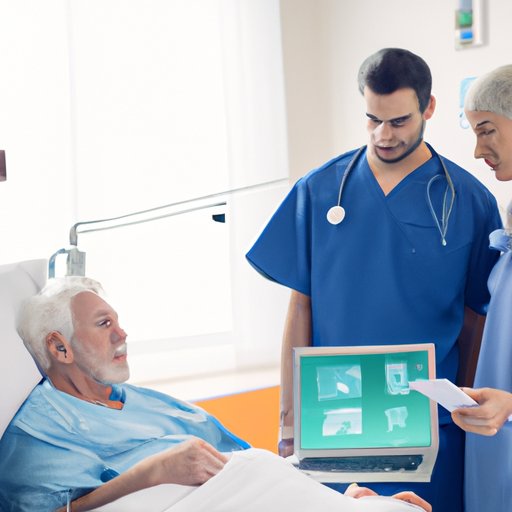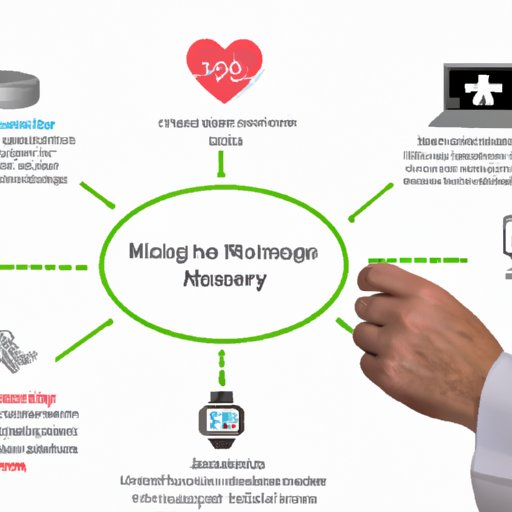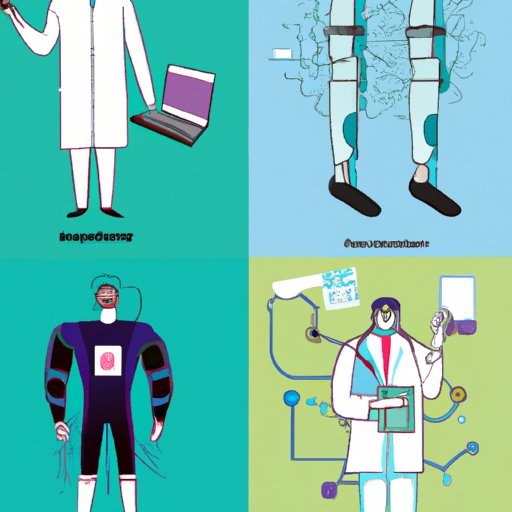Introduction
Technology has had a profound impact on the health care industry in recent years. From wearable devices to robotic surgery, the advances in technology have revolutionized the way health care is delivered and have opened up new possibilities for improving patient outcomes. This article will examine the various ways in which technology has impacted health care, exploring the benefits and challenges associated with its use.

Examining the Impact of Technology on Patient Care
One of the most significant impacts of technology on health care is improved access to care. With the rise of telemedicine and other digital health services, patients are now able to access medical advice and treatment from the comfort of their own home. This has been particularly beneficial for those living in rural or remote areas, where access to health care can be limited. Furthermore, it has helped reduce the burden on hospitals and other health care facilities, allowing them to focus their resources on more complex cases.
Another benefit of technology in health care is increased accuracy of diagnoses. With the help of advanced diagnostic tools such as MRI and CT scans, doctors are able to detect illnesses and diseases earlier, leading to better outcomes for patients. In addition, the use of electronic health records (EHRs) has enabled health care providers to easily share and access patient information, resulting in faster and more accurate diagnoses.
Finally, technology has also increased the efficiency of treatments. From robotic-assisted surgery to automated drug dispensing systems, technology has allowed health care providers to streamline their processes and reduce the amount of time needed to provide care. This has resulted in improved patient outcomes and reduced costs for both patients and providers.
Exploring the Benefits of Telemedicine
Telemedicine has been one of the biggest drivers of change in health care in recent years. By providing an easy and convenient way for patients to access medical advice and treatment, it has opened up new possibilities for delivering care. One of the major benefits of telemedicine is that it enables patients to access specialist care without having to travel long distances. This has been particularly beneficial for those living in remote or rural areas, who may not otherwise have access to the care they need.
In addition, telemedicine can also provide cost savings for patients. By reducing the need for hospital visits and other in-person appointments, it can help lower out-of-pocket expenses for those who are unable to afford traditional health care services. Similarly, it can also save time for providers, allowing them to see more patients in less time.

Analyzing the Role of Wearable Devices in Health Care Delivery
Wearable devices have also become increasingly popular in health care in recent years. These devices, such as fitness trackers and smartwatches, are designed to monitor a user’s health and provide real-time feedback. This can be beneficial for both patients and providers, allowing for improved patient monitoring and more informed decision making. For patients, these devices can provide greater convenience and comfort, as they do not require regular visits to the doctor’s office. In addition, they can also help reduce the need for hospital visits, as many conditions can be monitored remotely.
Investigating the Use of Robotics in Health Care
Robotics has also become an important tool in health care in recent years. Robotic-assisted surgery has become increasingly common, allowing surgeons to perform complex procedures with greater precision and accuracy. This has resulted in improved patient outcomes and reduced operating times and costs. In addition, robots can also be used for other tasks such as medication administration and sterilization, helping to reduce the risk of human error and increase safety for both patients and providers.
Evaluating the Impact of Big Data on Health Care
Big data has also revolutionized the way health care is delivered. By collecting and analyzing large amounts of data, health care providers are now able to make better informed decisions about patient care. This has led to improved data collection and analysis, enabling providers to identify trends and patterns in patient health outcomes. In addition, it has enhanced decision making capabilities, allowing for more personalized treatment plans and improved patient outcomes.

Assessing the Effectiveness of Artificial Intelligence in Health Care
Artificial intelligence (AI) is another technology that has had a major impact on health care. AI-powered tools such as machine learning algorithms and natural language processing are being used to improve the accuracy of diagnoses, reduce health care costs, and increase the efficiency of treatments. By automating certain tasks and freeing up time for providers, AI can help reduce the burden on the health care system and improve patient outcomes.
Conclusion
Technology has had a profound impact on health care in recent years. From improved access to care to increased accuracy of diagnoses, the advances in technology have revolutionized the way health care is delivered and have opened up new possibilities for improving patient outcomes. While there are still challenges associated with the use of technology in health care, the overall benefits far outweigh any potential drawbacks.
(Note: Is this article not meeting your expectations? Do you have knowledge or insights to share? Unlock new opportunities and expand your reach by joining our authors team. Click Registration to join us and share your expertise with our readers.)
